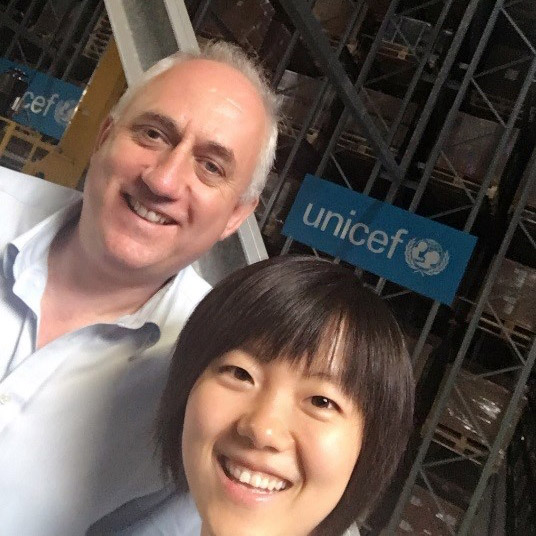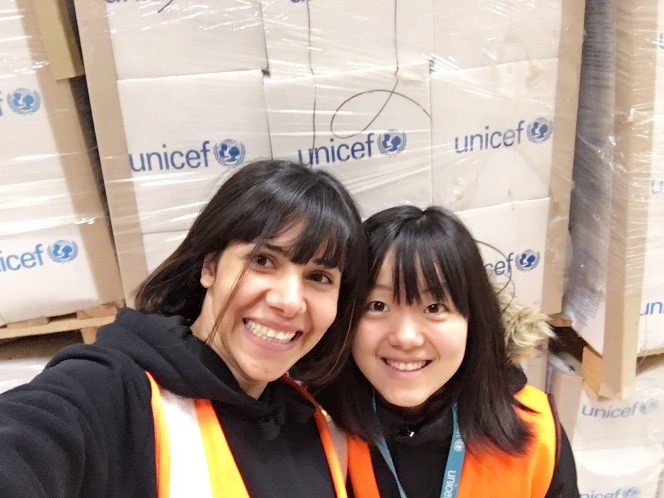Yuxi Wu has been avidly interested in supply chain and logistics ever since she was an undergraduate at Ohio State University, where she earned a bachelor’s degree in logistics management. The Stewart School of Industrial & Systems Engineering’s (ISyE) world-class academic reputation drew her to the Stewart School for her master’s in supply chain engineering (MSSCE 15). She also valued the opportunities the MSSCE program gave students to work on real-world projects with diverse teammates.
One project that Wu worked on while at ISyE – of which she still speaks with pride – was a routing project with an international pharmaceutical company. The project had eight team members from six different countries. With support from Professor John Vande Vate, they built a linear programming model that reduced unnecessary changeovers for more than 100 products and achieved a projected 300-plus working days’ savings for one of the company’s main manufacturing plants.
Wu was also able to build on her personal passion for applying supply chain principles to health and humanitarian organizations by enrolling in the Center for Health & Humanitarian System’s (CHHS) Global Logistics Scholars Program.
On a personal note, Wu is especially glad she studied at Georgia Tech: It was here that she met her now-husband, Chenliang Yang, who studied mechanical engineering (BSME 2016).
In the following interview, Wu discusses how the CHHS certification led to her current position with UNICEF as a supply chain analyst, what she does for the organization, and why it’s so important to apply supply chain principles to the work done by health and humanitarian organizations.
Why are supply chain and logistics so compelling to you?
Apart from commercial supply chain, which enables companies to maximize profit, humanitarian supply chain plays an ever-increasing role in providing essential support in the case of regional conflicts or natural disasters.
This is exactly where my passion is. Even though we have achieved great engineering advancements in terms of supporting crisis situations with cutting-edge techniques, there is more to do to optimize the entire process. Saving time and money means saving lives. I want to use my knowledge to make a difference in the world, and studying and working in supply chain and logistics can help me achieve that goal.
During your MSSCE studies at ISyE, you also earned a certification from the Center for Health & Humanitarian Systems (CHHS) in the Global Logistics Scholars Program. Why did you do this?
The CCHS certification program and showed me what supply chain experts can do in the humanitarian arena. Prior to taking this certification program, my expertise focused more on commercial supply chain – the goal of which is profit maximization. The CHHS certification opened my eyes to humanitarian supply chain – for which the ultimate goal is minimizing human suffering.
Since graduating, you’ve been working for UNICEF in Amman, Jordan, as a supply chain analyst. What drew you to this position?
I initially found out about the MENA (Middle East and North Africa) supply chain analyst position from CHHS co-director Julie Swann. I got really excited because I knew this was the opportunity for which I had been waiting.
Given that the Middle East is where many modern conflicts take place, I realized I could devote my knowledge and skills to improving the living conditions for these local communities, especially for children.
From the first day I joined UNICEF, I have worked with colleagues from different countries; their passion for humanitarian work, as well as supply chain, has been a big influence on me.
Describe what you do as a supply chain analyst for UNICEF.
My main responsibility is to develop supply chain monitoring dashboards to alert flags and risks, and to improve supply chain visualization. We have built several dashboards to monitor procurement processes, inventory, dispatches, key grants, services contracts, and container demurrage, and so forth. I have also worked with colleagues from other departments, such as nutrition and health, to create forecasting models for critical items to predict demand. Another responsibility I have is to conduct specific supply chain-related workshops for key UNICEF staff from different country offices in the MENA region.
Why are supply chain experts so essential to the success of health and humanitarian organizations?
More and more, people are seeing the importance of supply chain functionality in health and humanitarian organizations. Many humanitarian organizations have two “customers”: the people who need help and the donors. How to allocate donations to people in need effectively and efficiently is a question that always need to be answered.
For example, since I’ve been with UNICEF, we have procured different kinds of medications or vaccinations, which required careful, temperature-controlled transportation and storage. This is a big challenge in the hot, dry desert climate. Hence, health and humanitarian organizations really need the help of supply chain experts, to make sure that goods are handled properly – and ideally, at a lower cost. Any money saved means one more child can be helped.
What do the next three to five years look like for you professionally?
I would like to further develop my skills in and knowledge of humanitarian supply chain, and become a supply chain expert in this area. I am also considering conducting research on resilience in humanitarian supply chain. Supply chain resilience is an important consideration for commercial supply chain in terms of response to and recovery from unexpected events; however, research into the resilience of humanitarian supply chain is much more limited.
For More Information Contact
Shelley Wunder-Smith
Stewart School of Industrial & Systems Engineering
404.385.4745


